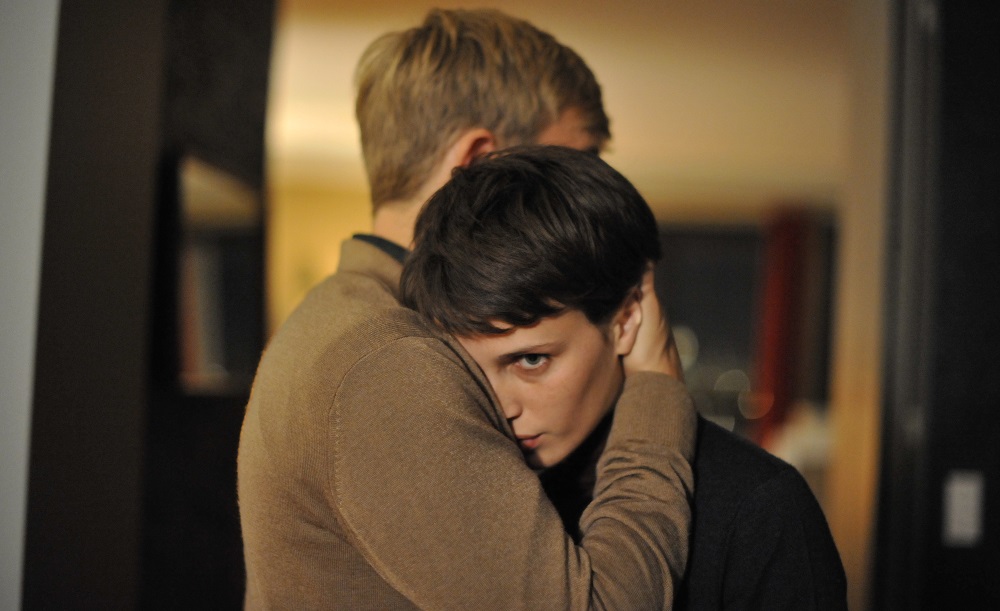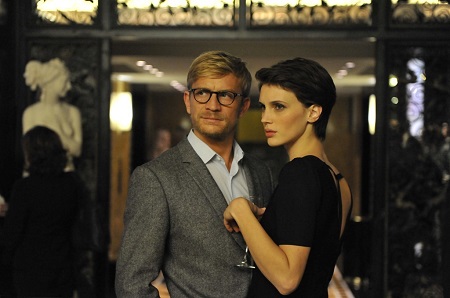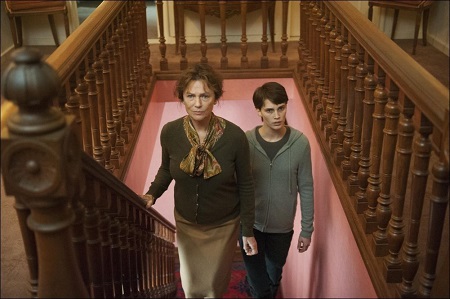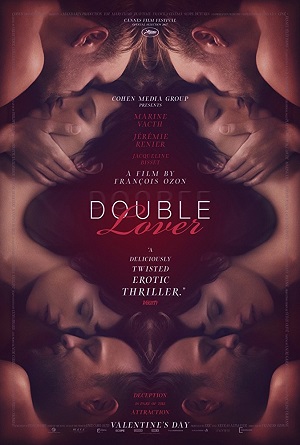
Unsettling Double Lover a Romantically Lurid Psychological Thriller
Chloé Fortin (Marine Vacth) is 25-years-old. She is a former model who became disillusioned with the life even though she was making good money. Suffering from frequent stomach pains, she goes to countless doctors, none of whom are able to come up with a credible diagnosis for what’s ailing her. Believing it might be psychosomatic, Chloé is referred to psychologist Paul Meyer (Jérémie Renier), a young, good-looking professional who quietly and intently listens to his new patient with a sensitive ear.
Fast-forward a few months, and even though it goes against all ethical standards, Paul has fallen for Chloé, the pair entering into a passionate relationship. They even move into an apartment together, their romance quickly speeding towards what looks like marriage and, in the future, children. But things are not as serene as they appear. Chloé suspects Paul is lying. As the young woman’s stomach pains return she also begins to dig into her boyfriend’s past, her grasp on reality beginning to fracture into a myriad of shimmery, light-catching pieces almost as if she were a mirror shattering on the bathroom floor after being cruelly pushed from the shelf in anger.
I was not familiar with Joyce Carol Oates’s novel Lives of the Twins before I sat down to watch writer/director François Ozon’s (Frantz, In the House) uncomfortably spellbinding adaptation Double Lover, so I had no idea just how crazily psychotic this lurid piece of pulp fiction was going to get. I almost don’t feel like one viewing of the film does it justice, and I find I’d like to jump right back in for a second viewing right away so I can spend more time dissecting its ominously abhorrent twists in greater detail. Ozon toyed with my emotions so completely I found myself alternating between hating what it was he doing here and loving it with every fiber of my being down to the last strand of DNA. Equal parts De Palma, Hitchcock, Cronenberg and Lynch, the acclaimed French auteur still manages to make the material his own, all of it centered upon a performance from rising star Vacth that’s as fearlessly complex as it is heartrendingly intimate.
It’s difficult to know how deep to dig into the plot, as spoiling one little nugget of what happens at any given point could potentially ruin the host of surprises Ozon has in store for the viewer. What can be said is that Chloé’s investigation reveals what she thinks is a double life for, not just Paul, but in many ways herself, too. By starting to explore her sexuality she begins to long for family, siblings and all the creature comforts of home in a manner she’s never felt worthy or deserving of in the past. But Chloé also uncovers more questions than there are answers, and the more craven her pursuits the more she starts to wonder if she’s cannibalizing her own flesh, almost as if she has some sudden longing to self-mutilate even though she’s certain none existed before Paul came into her life.
Vacth, whose first breakout role also came working for Ozon in 2013’s Young & Beautiful, is magnificent. Chloé mentions early on that she used to be a model, and the way the actress carries herself is a constant reminder of this passing remark. Her effortless physicality is spellbinding, especially when the weight of all that is happening begins to take its toll. Vacth showcases these mental and physical changes with graphically demoralizing subtlety, the ways in which Chloé begins to change as so many carnivorous adversaries, maybe real, maybe imagined, begin to eat away at her devastatingly visceral in their carnal succinctness.
Renier, another Ozon regular appearing in 1999’s Criminal Lovers and 2010’s Potiche, is also very good, but talking about his performance as Paul leads me into another narrative minefield where exploding a secret or two becomes something of a devilish inevitability. What I can say is that he plays two sides of a single coin. Darkness and light, levity and cruelty, love and lust; one does not exist without the other, the actor doing a grand job of toying with these dueling psychological aspects with a clever minimalistic enthusiasm that’s often unexpected. Two Grande Dames of French and British cinema, the wonderful Myriam Boyer and the luminous Jacqueline Bisset, also make appearances in a pair of key supporting roles. Both make immediate, unforgettable impressions yet I’m loath to go into any sort of detail about either of their characters, Bisset, in particular, having the greatest impact on Chloé’s quest to understand what is happening and what it will take for things to return to some sort of normalcy.
Manuel Dacosse’s (Evolution) sultry cinematography is intriguingly seductive in the way in which it utilizes symmetry, reflection, color and a swarm of mirror images to help augment the emotional and psychological ocean Chloé is attempting to navigate. It’s stunning stuff, so effortlessly refined it took me almost half the motion picture before I realized just how fully and completely he and Ozon were manipulating and subverting all if was I thought I was looking at. The way the pair kept me on my toes only helped make Chloé’s journey all the more bracingly affecting, the haunting final moments an emotional punch to the gut that left me speechless.
It can get fairly lurid at times, and I can’t say all of the purposefully cryptic pieces end up fitting together as succinctly as I found myself hoping they were going to. There’s also an inherent pulpiness here that sometimes becomes moderately, and I believe unintentionally, comical, a third act bit of full-blown, gorily unpleasant body horror not so much unnecessary as it is cartoonish its bloody asperity. Yet Ozon keeps the focus right where it needs to be no matter what is happening, Chloé standing right in the middle of all that transpires. As such, Double Lover is a gripping descent into the psychological abyss, the discoveries waiting to be found there captivatingly vast.
Film Rating: 3 (out of 4)








